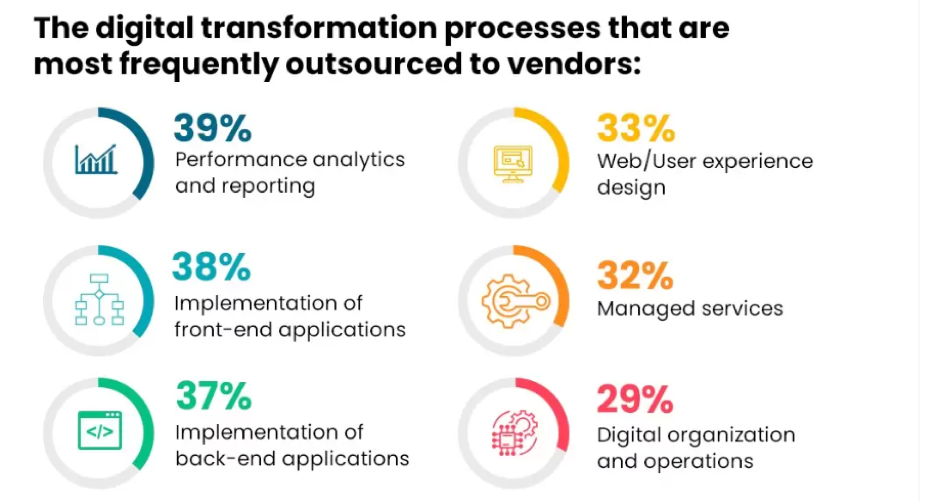Contents
- 1 Overview of The Current State of Software Outsourcing
- 2 Importance Of Understanding Future Trends And Predictions In The Industry
- 3 Evolving Landscape of Software Outsourcing
- 4 Automation and Artificial Intelligence (AI)
- 5 Rise of Agile and DevOps Practices
- 6 Cloud Computing and Infrastructure-as-a-Service (IaaS)
- 7 Security and Data Privacy Concerns
- 8 Collaboration and Communication Technologies
- 9 Impact of Emerging Technologies
- 10 Predictions for the Future of Software Outsourcing
- 11 Conclusion
Overview of The Current State of Software Outsourcing
Many entrepreneurs and businesses have held the term outsourcing. Outsourcing means engaging a third party, either local or international, organisation or individuals apart from the company to manage specific projects.
According to Statista, The global market value of software development outsourcing is expected to grow at an annual rate of 8.07% (CAGR 2023 – 2027), resulting in a market volume of US$587.30bn by 2027.
This exponential growth is driven by various factors, including the increased demand for quality software solutions, the need for cost-effective software development services, and the advancement of new technologies that expedite outsourcing software development.
The most popular software outsourcing services are software development, mobile application development, and IT Services.
India, Poland, the Philippines, Romania, and the Czech Republic are the most common choices for outsourcing software.
Lastly, healthcare, finance, and retail & eCommerce are the leading industries for software outsourcing.

Importance Of Understanding Future Trends And Predictions In The Industry
Software development is an ever-changing field constantly adapting to new technologies and frameworks. As we look far beyond 2023, indefinite trends and predictions will likely outline the software development.
Let’s look at the future trends and predictions in the software outsourcing industry.
Evolving Landscape of Software Outsourcing
The software development industry has undergone infinite changes since the COVID-19 pandemic and the Ukraine war. This enormous crisis caused significant interruptions in the operations of software development teams across the globe. The outcome? New ways of working and new tools to support software development.
Increased Globalization and interconnectedness
The Ukraine war has taught businesses the importance of diversification in outsourcing software development rather than risking it to a single country. It has led some businesses to look for alternatives to software development outsourcing, such as nearshore and multisourcing.
Outsourcing provides you access to global talent. For example, if you are looking for .Net programmers, you will have access to .net programmers across the globe.
Nearshore outsourcing implicates outsourcing to a country geographically close to the client’s location. This can help bridge the communication gap and low labour costs, making building partnerships with the outsourcing vendor easier.
Multisourcing, as the word implies, is outsourcing to multiple countries. It can help to reduce the risk of being debunked by political or economic crises in any one country and give businesses access to a wide range of skills and expertise.
Globalization and interconnectedness have made software development outsourcing a provocative option for companies of all sizes, from startups to entrepreneurs to large-scale industries.
Automation and Artificial Intelligence (AI)

Artificial intelligence and machine learning are promptly revolutionizing the software development industry. These technologies are used to automate tasks once done manually by developers and focus more on strategic and creative work. In addition to that, it improves quality and speeds up development cycles.
Impact of AI and Automation on software outsourcing
Artificial intelligence (AI) and automation are having a significant impact on the software development outsourcing industry. Here are some specific ways AI and automation can impact software development outsourcing.
- Automated code generation is possible using AI-powered tools, saving developers much time.
- AI-powered is used to automate the testing process, which can significantly improve the quality of the software. It is handy for regression testing, which can be time-consuming and tiresome to do manually.
- AI-powered tools can also automate the deployment process, which can help ensure the software’s faster-time-to-market. It is beneficial for microservices-based architecture, which is complex to deploy manually.
Rise of Agile and DevOps Practices
Agile and DevOps practices’ rise in software development outsourcing is directly proportional to the increasing demand for faster, more reliable, and secure software. Agile and DevOps methodologies are pertinent to meet these demands, as they allow for iterative development, continuous testing, and automated deployment.
Growing adoption of Agile and DevOps methodologies in software development
The adoption of Agile and DevOps methodologies has been augmenting promptly recently. It is due to various factors, including the broadening complexity of software projects, the need to deliver software more quickly, and the desire to improve software quality.
Benefits of Agile and DevOps for outsourced projects
Here are some of the benefits of adopting Agile and DevOps methodologies:
- Agile and DevOps methodologies can accelerate software development by breaking down projects into smaller manageable cycles.
- Agile and DevOps methodologies can enhance software quality by compiling testing and feedback into the development process.
- Agile and DevOps methodologies can reduce costs by eradicating waste and inefficiency in the development process.
- It can increase collaboration between multiple teams involved in the software development process.
Cloud Computing and Infrastructure-as-a-Service (IaaS)
Cloud computing and Infrastructure-as-a-Service (IaaS) are becoming increasingly popular in software development outsourcing, allowing businesses to access computing resources such as servers, storage, and networking on demand. It can eliminate extra costs and improve scalability.
Increasing reliance on cloud computing for software development
The reliance on cloud computing for software development outsourcing is increasing for several reasons, which are as follows ➖
- Cloud computing helps businesses save money on IT infrastructure costs. This is because clients only pay for the number of resources they utilize rather than purchase or maintain their hardware or software.
- It allows businesses to scale their IT resources up or down as needed.
- It can help businesses scale their IT infrastructure to meet their growing needs. This can be helpful for businesses experiencing rapid growth or needing to handle large volumes in demand.
- Cloud providers have robust security measures in the first place to protect their customers’ data.
Advantages of IaaS for software outsourcing providers and Clients
IaaS, Infrastructure as a Service, can be an excellent advantage for software outsourcing providers and clients.
For software outsourcing providers and clients, IaaS can:
- Providers and clients can reduce costs on hardware and software.
- Providers can Increase infrastructure scalability up or down as needed.
- Robust security measures to protect their client’s data.
- Providers can free up resources to focus on other tasks, such as developing and delivering software.
Security and Data Privacy Concerns
Security and data privacy are two of the biggest concerns for businesses considering software development outsourcing. When outsourcing software development, you necessarily provide vendor access to your company’s most sensitive data. It includes customer data, financial data, and intellectual property.
There are numerous things businesses can do to mitigate the security and data privacy risks associated with outsourcing software development. It includes ➖
- Do your research before choosing a vendor, and ensure they have a good track record of security and data privacy.
- Sign a non-disclosure agreement (NDA) to protect your confidential information
- Require the vendor to implement security measures like encryption, access controls, and vulnerability scanning.
Collaboration and Communication Technologies
Collaboration and communication are essential for the completion of successful software development, no matter whether its done in-house or offshsore. When teams are spread across different demographic regions, it is challenging to work collaboratively. However, several collaboration tools and communication technologies can aid these challenges.
Utilization of advanced collaboration tools and platforms
The increased utilization of advanced collaboration tools and platforms in software development outsourcing has been growing recently. It is because businesses choose to develop software in a distributed manner, with teams located across the globe.
Some of the popular collaboration and communication technologies for software development outsourcing are as follows:-
- Project management tools such as JIRA, Trello, and Asana help track progress, assign tasks, and communicate with team members.
- Code sharing and version control tools like GitHub, BitBucket, and GitLab allow the team to share code and track changes as needed.
- Communication tools such as Slack, Microsoft Teams, and Zoom allow teams to communicate in real time.
- Video conferencing tools such as Zoom, Google Meet, and Microsoft Teams allow the team to meet face-to-face with team members in different countries.
Impact of Emerging Technologies
Emerging technologies such as Cloud computing, Artificial intelligence (AI), Machine Learning (ML), and blockchain influence the software development outsourcing industry. These technologies make it easier, faster, and more cost-effective for businesses looking to outsource their software development needs.
If you have existing software in NodeJS technologies, look for new emerging nodejs technologies and ask your node js developers to implement it to make your software more efficient.
Opportunities and challenges presented by these technologies
Opportunities-
- Cloud Computing – allows businesses to access scalable and reliable computing resources on demand, helping businesses to save money and improve agility.
- Artificial Intelligence – is being utilized to automate many tasks, such as code generation, testing, and debugging. This help to improve the quality of the software and reduce the cost and time to market.
- Machine Learning – improves the accuracy and efficiency of software development processes.
- Blockchain – a distributed ledger technology – can be used to track and manage the software development process. It assists in improving the transparency and traceability of the project and reduces the risk of fraud.
Challenges-
- Security and Privacy to store sensitive data
- Complex to implement and use emerging technologies
- Emerging technologies are subject to regulatory compliance.
Predictions for the Future of Software Outsourcing
The future of software development outsourcing is bright. The industry is expected to thrive by 70% by 2023. Various trends are driving this promising growth and can benefit businesses. These are as follows:-
- The global demand for software development talent is growing faster than the supply, ultimately creating a shortage of skilled software developers.
This shortage urges businesses to outsource their software development needs to countries with larger pools of skilled software developers with low labor costs developing high-quality software, such as India and Eastern Europe.
- The growing popularity of cloud computing is making it easier and more cost-effective for businesses to outsource their software development requirements. Cloud computing and IaaS offer businesses to quickly and easily set up their software development environments.
- The increasing use of agile development methodologies is also thriving in the software outsourcing industry. Agile methodologies articulate collaboration and communication between developers and stakeholders, making communicating with the team and providing prompt feedback on the project easier.
Conclusion
The software outsourcing industry is steadily evolving, and the trends and predictions for the future are promising. The increasing usage of Cloud Computing, AI, and machine learning, has made software development more efficient and cost-effective. By outsourcing software development to multiple countries and not limiting it to any one country, businesses can mitigate the risk of uneven crises in the country. It is pioneering new opportunities for businesses of all sizes to outsource their software development requirements.

